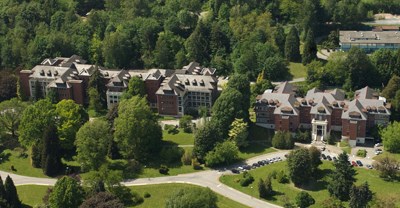The urgency of the opioid addiction crisis requires an immediate solution, and Coquitlam Mayor Richard Stewart says there's one available at Riverview Hospital.
Stewart is drawing on a 2014 report by Dr. John Higenbottam that suggested parts of the former mental health hospital could be repurposed to help those with drug addictions, and suggesting the provincial government could move quickly to open new beds at Riverview to help stem the tide of fentanyl overdose deaths.
"We hear the agonizing stories of parents who have tried to get their child into treatment," Stewart said, noting the emergence of fentanyl and carfentanyl are "game changers in so many ways" that demand an urgent response. "This [provincial] government has some decisions to make. This is simply to offer, as [Coquitlam] council did, a proposal that I think should be considered."
In his report, Higenbottam recommended establishing a specialized psychiatric hospital as a "centre of excellence for treatment, research and education with seriously mentally ill and severely addicted and mentally ill people," and that it be located in the Centre Lawn building.
Stewart said Centre Lawn was occupied by patients as recently as four years ago and could be refurbished relatively quickly to respond to the opioid public health crisis, with options for opioid replacement treatment or opioid abstinence programs.
Last week, the provincial government announced $10 million in funding for 60 new residential treatment beds, including 20 for youths and 40 for adults, as well as 50 intensive outpatient treatment spaces.
Those new services are expected to start opening this spring and will be delivered by a mix of private and public health care providers.
A request to the Ministry of Health for comment on where those beds would be located was not returned before deadline.
Stewart suggested an opioid-treatment facility at Riverview could be established and funded by the province, and operated by a health authority or Coast Mental Health, similar to the programs operating at Brookside and Hillside to treat those with severe mental illness and addiction. He added that it could transfer from an immediate solution at Centre Lawn or North Lawn to a purpose-built facility in the future.
He also said such a facility would fit in well with the ongoing revisioning process for Riverview.
"Every version of a vision for Riverview has included a mental health and addictions component," Stewart said, including the most recent vision that features a "significant precinct" for mental health and addictions. "The challenge is the immediacy and the urgency of the need."
Last week, the BC Coroners Service released its latest statistics showing the number of illicit drug overdose deaths in B.C. continues to increase every month. In December alone, 142 people died from the use of illicit drugs, the highest number ever recorded in a single month. In 2016, 914 people died — an increase of 80% from the number of deaths in 2015. Information on the number of 2016 deaths in which fentanyl was detected is expected in March.



